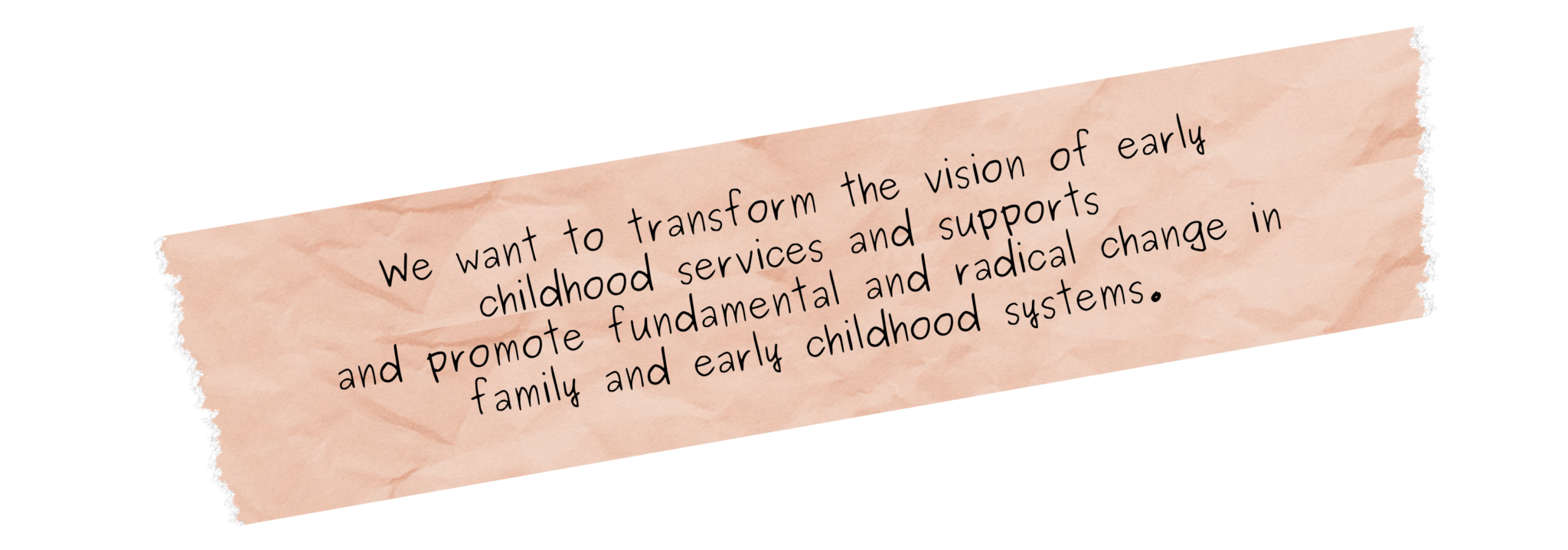
There are few forums to have conversations that truly push the envelope – forums that let us hear radical ideas from thinkers and doers within and outside of Early Childhood Intervention. Forums that provoke our thinking, to be curious and to question how, for example, ableism, dominant cultural norms, or power asymmetries marginalize and prevent families, and their children, from full participation in our society. We acknowledge the strides the field has made and now invite families and professionals to share new insights. We pose counter narratives and create shifting perspectives.
Christine Spence and Deborah Rooks-Ellis share their experiences and findings from a recently completed study that examined the unconscious attitudes of early interventionists. Besides surprising findings, they discussed some of their challenges when collecting and analyzing their interview data.
(Time: 43:04 minutes)
Ashley Cattaneo and Margie Brickley inspire us to examine how white supremacist culture is apparent and influences every system in the United States. They discuss how cultural responsiveness is often solely “surface level” and ignores the unique humanity of each and every child.
(Time: 51:35 minutes)
Serra Acar and Nikki Adams share with Bonnie ways of practice with refugee families, including the specific definition of refugee and how those experiences result in unique support needs that go beyond culturally responsive considerations.
(Time: 64:46 minutes)
In this second conversation with Iheoma Iruka, she challenges the early childhood community to band together with existing civil rights groups to make the appropriate care of children in the United States a civil rights issue. She describes how using a civil rights approach helps leverage the needed changes to enhance the future of children who are marginalized. CC
(Time: 22:16 minutes)
Iheoma Iruka inspires us through her insights as a social justice early childhood researcher of color. She focuses on the role that researchers play to create tension that encourages progress and the importance of hope that keeps people fighting for justice. CC
(Time: 29:53 minutes)
Tim Moore, from the Centre for Community Child Health, discusses the relationship between Early Childhood Intervention and mainstream services in Australia and how it is time to redesign these service systems. Though the conversation starts within the Australian context, many of the interesting ideas also apply to systems in other countries including the US.
(Time: 36:06 minutes)
Franchesca Ho Sang and Anthony Chin Kee Hee share their experiences and research on the importance of culturally sustaining mentoring that results from affinity, developing personal relationships, and reciprocal supports. They explain how the current definition and general impression of a mentor does not include these characteristics.
(Time: 52:26 minutes)
Xigrid Soto-Boykin and Diana Abarca, both Latinx speech and language pathologists (SLP) and academics, tell us about their journey to the work they are currently doing. This conversation includes the development policies that promote equity in access to and involvement in high quality programs for all children who are bilingual. Their willingness to share their often-painful challenges is a gift which we greatly appreciate.
(Time: 34:07 minutes)
In this video, Xigrid Soto-Boykin and Diana Abarca, two Latinx speech and language pathologists (SLP) and academics, discussed aspects of academia that present challenges for them to accomplish the research that they feel is most likely to help Latinx families and children. They discuss what is valued and not valued in academia and the pressure they feel to assimilate these values without being allowed to acknowledge their unique cultural perspectives.
(Time: 17:58 minutes)
January 2023: The world of early childhood intervention lost a valued voice. Talina Jones, mother of Tajee, was known as a parent advocate. However, Talina was so much more. She was the voice of those who were not given a voice. She took her space when no one offered her space. She was authentically, unapologetically herself. Talina was fierce in her honesty, calling out racism where she experienced it – with practitioners, administrators, systems, and policies. She was our friend, our accomplice, and our motivator. We miss Talina greatly at The Envelope and will miss the discussions we didn’t get to have. Our small honor at this time is to re-share those discussions we had with Talina. Please take some time to digest Talina’s words and, if she motivates you too, to take action.
Talina Jones, who describes herself as a Black feminist, describes the ways she parents her son at the intersection of race and disability. Talina shares the joys and trials of supporting her son from birth to young adulthood and highlights the ways professionals were and were not helpful in the journey.
(Time: 49:55 minutes)
Michael Barla shares with us his approach to preservice professional development – building community with humility, demonstrating reflection in practice, and continuously evaluating his practices. Michael prepares emerging practitioners with a social-emotional mindset, modeling what we ask of professionals with families and their children as he prepares emerging practitioners.
(Time: 58:34 minutes)
Mary Louise Hemmeter from the Vanderbilt University talks with us about the Pyramid Model for Supporting Social Emotional Competence in Young Children. She discusses how peoples’ biases can impact how adults see children’s behavior and the challenges to making the necessary structural changes to build an early care and education system in the US. for all young children and their teachers.
(Time: 36:55 minutes)
Sonja MacFarlane and Julie Houghton from Massey University in New Zealand talk with us about a cultural framework for early childhood educators that’s based on three human rights principles- partnership, protection, and participation. They share how these principles are woven into the everyday actions of practitioners, the way the Māori cultural beliefs impact educators’ interactions, and their plea to researchers. practitioners, and students to listen to culture.
(Time: 37:05 minutes)
Hailey Love joins us again to share her insights about family engagement and how teachers can develop equitable family engagement in inclusive classrooms. Hailey challenges us to work on genuine two-way communication by asking families that are often marginalized what a respectful relationship looks like to them.
(Time: 22:02 minutes)
Hailey Love shares her thoughts about how program quality can look different in contexts and to different people. She discusses how this approach challenges the current approach that is “conceptualizing and measuring quality in a standardized universalist way.”
(Time:37:48 minutes)
Janice Fialka shares insights on the messy and marvelous work of validating family and professional feelings and the impact on their relationships. Janice challenges us to move and motivate around notions of denial, hope, and the practice of calling families “experts.”
To dive deeper into Janice’s books, articles, and presentations, check out: http://www.danceofpartnership.com/
(Time: 34:56 minutes)
Jordyn Zimmerman and Jen Newton discuss attitudes, labels, and behaviors related to inclusion and ableism, with specific examples and implications in practice, systems, and personnel preparation. They share how their relationship was built over time to honor and respect each other’s thoughts and ways of communicating.
(Time: 56:24 minutes)
Sylvana Mahmic from Plumtree Early Childhood Intervention program in Australia shares her thoughts about family leadership and parents as peer workers. She challenges our thinking about pathways for families and provides examples of new approaches that are being implemented at Plumtree.
(Time: 37:55 minutes)
Crispin Day from the United Kingdom talks with us about the Family Partnership Model and contrasts expert relationships with partnership relationships. Crispin suggests that rather than dispensing advice, our job is to ask questions like What do you think? Where are you coming from on this? What do you know? What worked for you in the past? What would you feel capable of in the future? and Where do your priorities lie on this? It’s only then that we start to understand where others’ are coming from and can begin to think about what we could contribute.
(Time: 40:15 minutes)
Crispin Day from the United Kingdom inspires us by sharing information about the development of the Empowering Parents Empowering Communities (EPEC) program. EPEC is a peer led approach developed with the community, rather than provided to the community. Crispin talks about how the EPEC program is built on partnership approaches and “comes alive” by the parent leader.
(Time: 15:23 minutes)
Greg Cheatham and Christine Hancock challenge us to analyze the ways professionals’ do, say, and be which can either support or hinder family-professional partnerships in making early childhood intervention decisions, most particularly in partnerships with families from marginalized communities. They discuss the implications for professional development and ways they are preparing university students for family-professional interactions.
(Time: 58:50 minutes)
Paul Prichard from the Murdoch Children’s Research Institute in Australia shares his thoughts about co-design, power and parents and professionals working together as contributors. Paul challenges our thinking about parents as co-workers and the importance of humility.
(Time: 34:17 minutes)
Tola Makinde is a parent of three children, the youngest with Down syndrome. In this video, Tola discusses how she is trying to push the envelope in Nigeria regarding perceptions of intellectual disabilities and supports for families, including the use of social media for awareness and connection.
(Time: 36:25 minutes)
Tola has a YouTube channel that includes interviews with families
Catherine Corr and Kate Ellison discuss the importance of strengths-based practices with families with multiple support services that frequently do not received practices in a strengths-based manner, and ways practitioners can be prepared and work.
(Time: 52:12 minutes)
DisCrit explores the intersections of race, class, and dis/ability. David Connor, one of the co-creators of DisCrit, shares what DisCrit is, some misconceptions, and what it means for how we practice.
(Time: 29:04 minutes)
This conversation is with Shayla Collins and Maggie Beneke who have worked together on several projects through the University of Washington. Their discussion includes their work in co-designing a narrative with community members who are impacted by special education teachers, how the dominate culture beliefs about parenting negatively impact BIPOC (Black, Indigenous, and People of Color) parents, and how erasure of BIPOC history and their lived lives continues to cause harm to families.
(Time: 52:00 minutes)
Beth Harry and Lydia Ocasio-Stoutenberg discuss what advocacy means for families of children with disabilities who belong to a racial and ethnic group that have been historically marginalized. They elaborate on the ideas shared in their book, Meeting Families Where They Are.
(Time: 53:15 minutes)

This entry is licensed under a Creative Commons Attribution-NonCommercial-NoDerivatives 4.0 International license.


